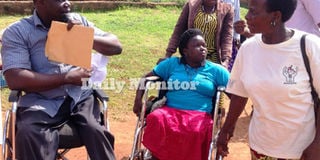PWDs call for tax waiver on supportive devices

Persons living with disabilities (PWDs) have called on government to waive taxes on some of the supportive technology devices that enables them to improve their functional capabilities. FILE PHOTO
What you need to know:
Reasons. They say this will enable them access the much needed devices cheaply.
Persons living with disabilities (PWDs) have called on government to waive taxes on some of the supportive technology devices that enables them to improve their functional capabilities.
The PWDs argue that some of the devices are not in the country and in case they are to be imported, they are very expensive to purchase because of the heavy taxes levied on them.
They raised their concerns during a sensitisation and awareness creation workshop on Information, Computer and Technology (ICT) organised by the ICT Ministry on Tuesday in Gulu Town. The meeting was attended by PWDs, Gulu District officials, lecturers and students from Gulu University. The meeting is part of a countrywide consultation being carried out by the ministry on the ICT policy instruments for PWDs.
The policy instruments are intended to serve as an intervention by government to close gaps in the use of ICTs by PWDs.
Ms Gloria Evelyn Piloya, one of the PWDs in Gulu Municipality, said majority of them are poor and that they cannot afford to purchase some of the devices.
Ms Piloya cited categories of PWDs such as mental health and physical impairments as some of the worst affected.
She said this has affected PWDs in their struggles to independent living and carrying out daily activities.
“We are advocating through Uganda Revenue Authority (URA) to waive off the taxes on assistive devices. PWDs are the poor of the poorest and therefore most of them won’t be able to afford such technology devices,” Ms Piloya said.
She also noted that many non-governmental organisations that provide such devices to PWDs in the country have challenges with the taxes imposed on them yet they bring it freely to the disabled persons.
“If taxes are waived off the devices, we are optimistic that some disabled persons will be able to afford them. The government has to listen to us,” Ms Piloya said.
Mr Silas Ngabirano, the assistant Commissioner of Information Management Services in the Ministry of ICT, acknowledged that PWDs are facing hurdles in accessing information since few firms sell such devices in the country.
He noted that one of the avenues they are working on is to bring on board more tech firms to avail these devices cheaply to the disabled persons in the country.
“We are working on creating awareness with technology firms so that they get to know Uganda has a larger population of people living with disabilities. Currently, 15 per cent of the population are PWDs. We want them to know that the market for such devises are available,” Mr Ngabirano said.
He, however, said there is limited capacity among Ugandans to create soft wares that would help the locals saying some of the soft wares manufactured from outside the country such as voice recognition don’t favour the local dialects.
The policy instruments for ICTs for persons with disabilities that is currently in its final stages of being developed is expected to be launched in January next year in Kampala according to Mr Ngabirano.
In February this year, the National Union of Disabled Persons of Uganda called on the government and various stakeholders to raise funds for procurement of assistive devices for persons living with Disabilities in the country.
According to 2014 population census statistics, Acholi sub-region alone has 17.3 percent Pwds. End
THE DEVICES
Among some of the technology devises are cognitive aids including computer or electrical devices, computer software and hardware such as voice recognition programmes, screen readers and screen enlargement applications to help people with mobility issues use computers and mobile devices.




